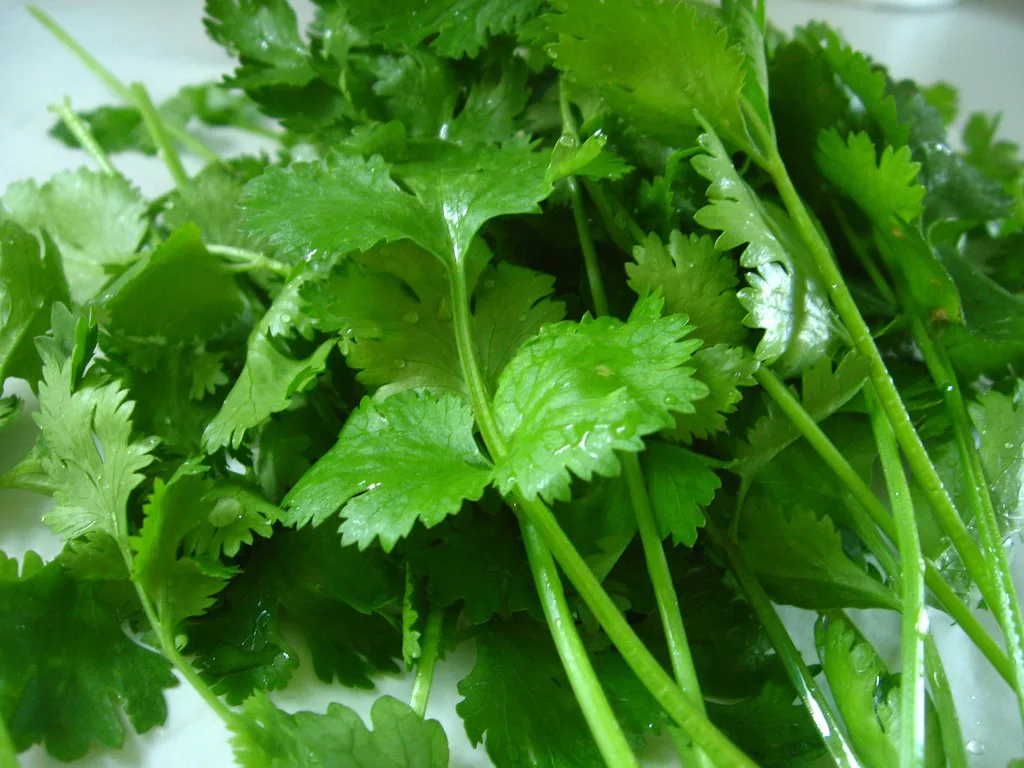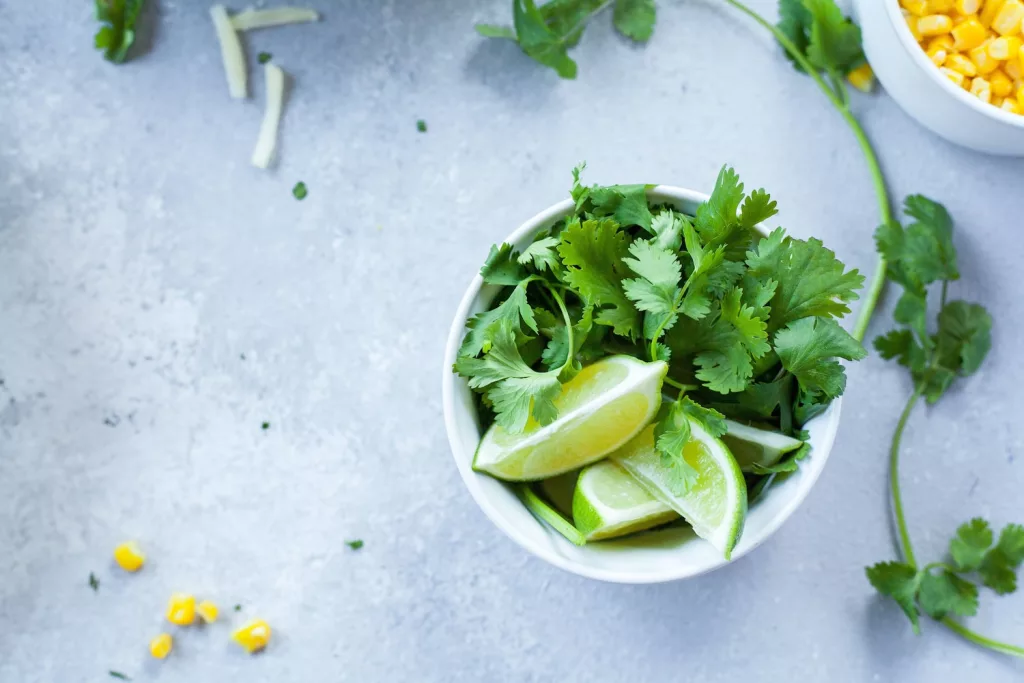In the realm of culinary delights, few herbs can match the distinctiveness and polarizing nature of cilantro. Also known as coriander or Chinese parsley, cilantro is a versatile herb that adds a burst of fresh, citrusy flavor to countless dishes worldwide.
Loved by some and despised by others, this herb has a fascinating history and a range of culinary uses that make it a true superstar in the culinary world.
In this blog post, we will dive into the health benefits of cilantro, exploring its origins, flavors, and diverse applications in cooking.
Table of Contents
Origins and Flavors
Cilantro has been cultivated for centuries and is believed to have originated in the Mediterranean region, Northern Africa, and Southern Europe. It was subsequently introduced to Asia, Latin America, and other parts of the world. Both the leaves and seeds of the cilantro plant are highly valued for their culinary purposes.
The leaves of cilantro possess a unique flavor profile that can be described as fresh, citrusy, and slightly peppery. Some people also detect subtle floral undertones. The seeds, commonly known as coriander seeds, have a warm, nutty, and slightly sweet flavor that differs from the leaves. The combination of these distinct flavors allows cilantro to be used in a variety of dishes across different cultures.

Culinary Uses Of Cilantro
Cilantro is an integral ingredient in many cuisines, including Mexican, Indian, Thai, Middle Eastern, and Caribbean. Its versatility stems from its ability to enhance the flavors of both savory and sweet dishes. Here are some popular applications of cilantro in cooking:
- Fresh Herb: The vibrant green leaves of cilantro are often used as a garnish or chopped and sprinkled over dishes to add a burst of freshness. It pairs exceptionally well with salsas, guacamole, salads, and ceviche.
- Aromatic Spice: Coriander seeds derived from the cilantro plant are ground into a powder that acts as a key spice in various curries, stews, and marinades. It imparts a warm, earthy flavor and is a staple in Indian and Middle Eastern cuisines.
- Flavorful Salsa: Cilantro, when combined with tomatoes, onions, lime juice, and other complementary ingredients, creates a delicious and refreshing salsa that is perfect for dipping tortilla chips or topping grilled meats and seafood.
- Herbaceous Dressings and Sauces: Cilantro can be blended into dressings, sauces, and chutneys, adding a vibrant green color and tangy flavor. These versatile condiments elevate the taste of sandwiches, wraps, and grilled vegetables.
Health Benefits of Cilantro
Cilantro, also known as coriander or Chinese parsley, offers more than just its vibrant flavor and aroma. This versatile herb is packed with potential health benefits, making it a valuable addition to your diet. Here are some of the notable health benefits of cilantro:

1. Nutritional Profile
Cilantro is low in calories but rich in essential nutrients. It contains vitamins A, C, and K, as well as minerals such as potassium, manganese, magnesium, and calcium. Additionally, cilantro provides dietary fiber and small amounts of antioxidants.
2. Antioxidant Power
Cilantro contains various antioxidants, including flavonoids, phenolic compounds, and vitamin C. These antioxidants help protect your body against damage caused by harmful free radicals, potentially reducing the risk of chronic diseases, such as heart disease and certain cancers.
3. Digestive Support
Cilantro has traditionally been used to support digestion. It contains compounds that may aid in promoting healthy digestion, relieving gastrointestinal discomfort, and reducing bloating. Cilantro may also help stimulate enzyme production, supporting efficient digestion and nutrient absorption.
4. Anti-Inflammatory Properties
Certain compounds found in cilantro, such as linoleic acid, cineole, and borneol, exhibit anti-inflammatory properties. These properties may help reduce inflammation in the body, which is associated with various chronic conditions, including arthritis, cardiovascular disease, and certain digestive disorders.
5. Detoxification Support
Cilantro has long been recognized for its potential detoxifying properties. It may assist in the elimination of heavy metals, such as mercury, lead, and aluminum, from the body. These metals can accumulate over time and may have detrimental effects on health. However, further research is needed to fully understand cilantro’s role in detoxification processes.
6. Blood Sugar Regulation
Preliminary studies suggest that cilantro may help regulate blood sugar levels. Compounds present in cilantro may enhance insulin secretion and improve glucose metabolism, potentially benefiting individuals with diabetes or those at risk of developing the condition. Nonetheless, more research is necessary to validate these findings.
7. Antimicrobial Effects
Cilantro contains certain compounds, such as dodecanal, that possess antimicrobial properties. These properties may help inhibit the growth of certain bacteria and fungi, potentially contributing to improved oral health and reduced risk of infections.
It’s important to note that while cilantro offers potential health benefits, individual responses may vary. Allergies or sensitivities to cilantro are rare but can occur. If you experience any adverse reactions after consuming cilantro, discontinue use and consult with a healthcare professional.
Incorporating Cilantro into Your Diet:
To reap the potential health benefits of cilantro, consider incorporating it into your meals and recipes. Use it as a garnish for soups, salads, and tacos, or blend it into sauces, dips, and dressings. Cilantro also pairs well with citrus flavors, making it a fantastic addition to salsas and marinades.
Remember to consume cilantro as part of a well-balanced diet that includes a variety of fruits, vegetables, whole grains, lean proteins, and healthy fats. Enjoy the unique flavors and potential health perks that cilantro brings to your culinary creations.
How Much To Eat Cilantro For Health Benefits

When it comes to incorporating cilantro into your diet for its potential health benefits, there is no specific recommended daily intake or dosage.
Cilantro is generally safe for consumption in reasonable amounts as part of a balanced diet. However, it’s important to keep in mind that individual sensitivities and allergies can vary.
Here are a few considerations to keep in mind regarding cilantro consumption for health benefits:
- Incorporate Variety: Including a variety of herbs and spices in your meals is a great way to promote overall health and add flavor to your dishes. Cilantro can be enjoyed in moderation alongside other herbs to enhance the nutritional value and taste of your meals.
- Balanced Approach: While cilantro offers potential health benefits, it’s important to remember that a well-rounded diet consisting of diverse fruits, vegetables, whole grains, lean proteins, and healthy fats is crucial for overall wellness. Cilantro should be viewed as a complementary ingredient rather than a sole source of nutrition.
- Personal Tolerance: Some individuals may have specific sensitivities or allergies to cilantro. If you experience any adverse reactions such as digestive issues, skin rashes, or difficulty breathing after consuming cilantro, it is advisable to consult with a healthcare professional.
- Varied Preparations: Cilantro can be consumed fresh or dried, and both forms offer distinct flavors and potential health benefits. Experiment with different preparations to find what works best for your palate and dietary preferences.
- Nutrient Diversity: While cilantro contains certain vitamins, minerals, and antioxidants, it’s important to consume a wide range of nutrient-dense foods to ensure you meet your overall nutritional requirements. Cilantro can be a part of a balanced approach to a healthy diet, but it should not be relied upon as the sole source of nutrients.
Remember, it’s always a good idea to consult with a healthcare professional or a registered dietitian for personalized advice and recommendations based on your specific health needs, dietary preferences, and any underlying conditions you may have. They can provide guidance on incorporating cilantro into your diet in a way that aligns with your overall health goals.








